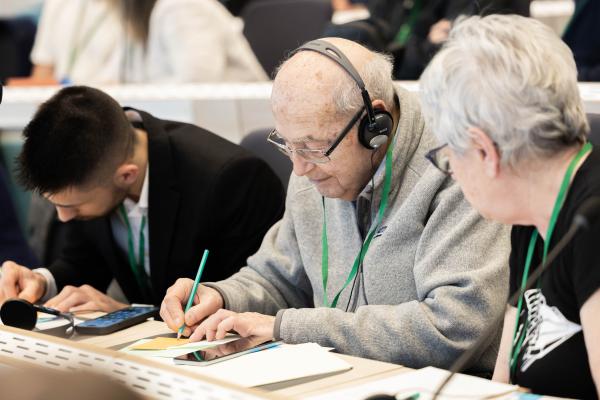Problem addressed
Across Europe, schools are facing growing challenges linked to student disengagement, educator burnout, and a widespread sense of disconnection from meaning and purpose. Many young people experience school as irrelevant to their lives, leading to apathy, low motivation, and fragile mental health. Educators themselves often report feeling overwhelmed, unsupported, and emotionally drained, especially in socioeconomically vulnerable contexts. These dynamics are compounded by: - The rise of digital overload and disinformation, which fuels distraction, polarisation, and anxiety among students; - Growing cultural and ethnic diversity in classrooms, which, while enriching, also brings challenges in promoting dialogue, empathy, and mutual understanding; - Persistent educational inequalities, where systemic barriers continue to affect the learning and life opportunities of the most disadvantaged; - A lack of structured, values-based approaches in schools to promote civic engagement, human dignity, and emotional literacy. There is a pressing need for transformative educational responses that restore connection — to self, others, and society — and that equip both students and educators with the human skills to navigate complexity, embrace diversity, and lead with empathy.
Innovative solution
Ubuntu Schools offers an innovative and systemic response to current educational challenges through a structured, values-based methodology that places human dignity, empathy, and service at the heart of learning. What makes Ubuntu Schools truly innovative is: - A unique pedagogical framework rooted in the Ubuntu philosophy — “I am because you are” — that combines socioemotional learning, ethical leadership, intercultural dialogue, and narrative identity. These themes are not addressed in isolation, but as interconnected dimensions of personal and collective development. - A multi-level methodology that goes beyond content to work deeply on relationships and school culture. This includes experiential learning, storytelling, peer dialogue, and collective rituals of recognition — which create safe spaces for growth, reflection, and belonging. - A robust “training of trainers” model, which builds internal capacity within schools and educational institutions. By equipping educators to facilitate the methodology themselves, the programme ensures longterm sustainability and embedded impact, rather than dependency on external actors. - The creation of Ubuntu Clubs: educators and student-led groups that foster peer support, social action, and community involvement. These clubs anchor the values and practices of Ubuntu in the daily life of the school, while extending their reach into families and local communities through intergenerational and participatory initiatives. - A whole-school and whole-community approach, which sees the school as a living ecosystem. Ubuntu Schools actively engage school leaders, teachers, students, parents, and local stakeholders in a shared journey of transformation. By integrating emotional, ethical, civic, and intercultural learning in a cohesive and accessible way, Ubuntu Schools is not just a programme — it is a shift in how we think about education, leadership, and community.
Key results and benefits
- Over 430 schools implemented the programme
- More than 5,000 educators trained as Ubuntu educators
- Improved school climate and student engagement
- Enhanced leadership and empathy skills among youth
- Creation of inclusive and supportive learning environments
- Strong partnerships with local authorities and national education bodies
Potential for mainstreaming
Ubuntu Schools has demonstrated strong potential for mainstreaming, both nationally and at the European level, due to its scalability, institutional recognition, and alignment with key educational frameworks.
Originally piloted in 6 schools, the programme has rapidly scaled to over 140 schools across Portugal, with the official endorsement of the Portuguese Ministry of Education, which adopted the Ubuntu methodology as one of the core responses in the national Learning Recovery Plan 21|23 Escola+.
This institutional integration reflects the relevance and credibility of the programme at policy level. The "train-the-trainer" model is a key driver of scalability and sustainability. By empowering educators and school staff to become certified Ubuntu facilitators, the programme builds internal capacity and reduces dependency on external trainers — ensuring long-term implementation and ownership within school communities.
Another core innovation is the creation of Ubuntu Clubs, which bring together students, teachers, and local stakeholders in inclusive spaces for dialogue, service, and civic engagement. These Clubs act as hubs of transformation, ensuring that the values of empathy, dignity, and leadership permeate the entire school ecosystem and reach families and communities.
The Ubuntu Schools framework is aligned with the “Student Profile at the End of Compulsory Schooling” (Perfil do Aluno à Saída da Escolaridade Obrigatória), the national benchmark for student competences in Portugal. It is also consistent with the internationally recognised CASEL framework, promoting selfawareness, social awareness, responsible decision-making, relationship skills, and self-management.
Moreover, the Ubuntu methodology has been recognised as an innovative educational experiment by the Gulbenkian Knowledge Academies (Academias do Conhecimento), further validating its potential for replication and adaptation in diverse educational contexts.
This combination of institutional endorsement, theoretical alignment, sustainable delivery model, and community engagement mechanisms positions Ubuntu Schools as a high-potential solution for mainstreaming across Europe and beyond.




